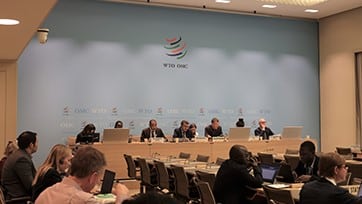Los Miembros de la OMC estudian formas de reforzar las economías de los PMA

En una reunión del Subcomité de Países Menos Adelantados (PMA) celebrada el 31 de mayo, los Miembros de la OMC analizaron iniciativas encaminadas a incrementar la producción económica de los países más pobres del mundo. Angola, Rwanda y algunas organizaciones internacionales compartieron su experiencia en materia de mejora de la capacidad económica de los PMA.
(de momento sólo en inglés)
“Strengthening the productive capacity in LDCs is an important priority for the international community. It has been recognized in the Doha Programme of Action for LDCs for the next decade,” said Ambassador Erik Brøgger Rasmussen, chair of the LDC Sub-Committee. The purpose of the meeting, he added, is to “look at some of the ongoing efforts aimed at strengthening productive capacity in LDCs and how some of the good practices can be scaled up.”
Supporting economic diversification and strengthening trade institutions in LDCs featured prominently in the discussions, with several speakers stressing that trade policy and trade facilitation reforms are among the private sector’s top recommendations.
Angola presented a project it is undertaking in cooperation with the European Union and the United Nations Conference on Trade and Development (UNCTAD) aimed at supporting economic diversification, strengthening institutional capacity and deepening Angola’s integration into regional and global trade. “We need to strengthen economic resilience to external shocks and address climate-related vulnerabilities,” Angola’s Secretary of State for Trade and Industry, Amadeu Nunes, said. We are currently working with UNCTAD in developing a strategy to pave the way for graduation from LDC status, he added.
Rwanda’s Director General for Trade and Investment, Antoine Karangwa, said: “Our cooperation with the World Bank builds on Rwanda’s national priorities. Together, we are working to improve connectivity, foster export diversification, boost services trade, harness the potential of regional blocs and attract foreign direct investment into our country.” Mr Kajangwe presented a trade facilitation project which has brought about greater coordination of border management across the country.
The Organisation for Economic Co-operation and Development (OECD) outlined its support for economic transformation in Bangladesh and Togo. Transforming what these countries produce, consume and trade, promoting renewable energies, boosting digitalization and furthering regional and continental integration are among the objectives being pursued, it said.
Presenting its Productive Capacities Index, UNCTAD said the LDCs recommended for graduation by the United Nations Committee for Development Policy are making greater progress than other LDCs in building productive capacities, approaching the level of developing economies.
The World Bank highlighted that its Aid-For-Trade initiatives in LDCs range from diagnostics and institutional strengthening to budget support for key trade policy reforms and investment lending for productive capacity.
The United Nations Industrial Development Organization (UNIDO) noted that LDCs’ share of global manufacturing has remained static at 13 per cent since 1990. Part of its work to promote structural transformation in LDCs includes the West Africa Competitiveness Programme and Quality Infrastructure. UNIDO also noted that USD 1.9 billion have been mobilized in 2020 to help achieve Ethiopia’s goals for industrial development under the Programme for Country Partnership.















